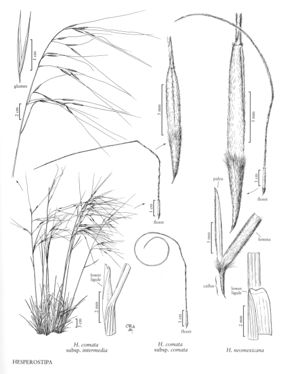Difference between revisions of "Hesperostipa neomexicana"
FNA>Volume Importer |
imported>Volume Importer |
||
| Line 43: | Line 43: | ||
|publication year= | |publication year= | ||
|special status= | |special status= | ||
| − | |source xml=https:// | + | |source xml=https://bibilujan@bitbucket.org/aafc-mbb/fna-data-curation.git/src/bb6b7e3a7de7d3b7888a1ad48c7fd8f5c722d8d6/coarse_grained_fna_xml/V24/V24_220.xml |
|subfamily=Poaceae subfam. Pooideae | |subfamily=Poaceae subfam. Pooideae | ||
|tribe=Poaceae tribe Stipeae | |tribe=Poaceae tribe Stipeae | ||
Revision as of 21:45, 27 May 2020
Culms 40-100 cm; lower nodes glabrous. Lower sheaths glabrous or puberulent, not ciliate; ligules of lower leaves 0.5-1 mm, thickly membranous, rounded; ligules of upper leaves to 3 mm, scarious, acute; blades 0.5-1 mm wide. Panicles 10-30 cm. Glumes subequal, 30-60 mm; florets 15-18 mm; calluses 4-5 mm; lemmas evenly pubescent, hairs shorter than 1 mm; awns 120-220 mm, first 2 segments hairy, hairs mostly 0.2-1 mm, terminal segment flexible, pilose, hairs 1-3 mm. 2n = 44.
Distribution
Okla., N.Mex., Tex., Utah, Wyo., Colo., Ariz., Nev.
Discussion
Hesperostipa neomexicana grows in grassland, oak, and pinyon pine associations, from 800-2400 m, usually in well-drained, rocky areas in the southwestern United States and adjacent Mexico. It is similar to H. comata subsp. comata, differing in its longer awn hairs and shorter ligules.
Selected References
None.
